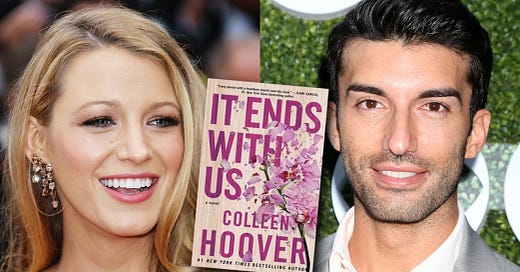Women Who Practice Misogyny and the Men Who Love Them
or why I still don't trust Blake Lively, despite her victimhood
EDIT as of 11:56 PM: more details have come out about Justin Baldoni via The New York Times. He has since been dropped from his agency, WME, the same company that represents Blake Lively and Ryan Reynolds.
Blake Lively is in trouble again, but this time the narrative is in her favor.
After disastrous media coverage for her movie “It Ends With Us” that left bad feelings between her and her costar Justin Baldoni, she is accusing Baldoni of running a smear campaign against her and covering up alleged sexual harassment that happened on set.
She said that Baldoni should no longer do the following: “Show nude videos or images of women to Blake, no more mention of Baldoni's alleged previous ‘pornography addiction,’ no more discussions about sexual conquests in front of Blake and others, no further mentions of the cast and crew's genitalia, no more inquiries about Blake's weight, and no further mention of Blake's dead father.”
The movie was a big failure in part because Blake Lively decided to portray issues of domestic violence under rose-colored glasses. Watchers of the film described it as a “rom-com” and “in bad taste.”
However, it’s crucial to note that Sony’s official marketing plan for the film directed cast members to avoid framing it as a “sad or heavy” story about domestic violence, focusing instead on "hope" and "resilience."
Both Baldoni and Lively followed these instructions, with the results being both of them making it about themselves.
Lively’s tone-deaf contributions to the marketing campaign of It Ends With Us veered into harmful territory: one of Lively’s promotional strategies was the decision to serve cocktails named after characters in It Ends With Us, including the abuser Ryle.
Given the well-documented link between alcohol and domestic violence, this choice reflects a profound misjudgment.
But Baldoni took it a step further. He improvised intimate scenes without consent, asked invasive personal questions, and attempted to shame her for her postpartum body.
Moreover, the retaliation campaign orchestrated by Baldoni and his team demonstrates the calculated nature of the attacks against her.
This campaign involved “astroturfing,” a practice of planting misleading narratives online to discredit Lively while bolstering Baldoni’s image as an ally of DV survivors.
So what is going on here?
Many of those who believe in the MeToo movement accurately state that society needs to stop blaming victims for their abuse and that bringing up character flaws and bad behavior is not fair to women.
Two questions:
Can a woman complicit in the perpetuation of misogyny and systemic oppression still be a victim of it?
And does her complicity erase the legitimacy of her grievances when targeted by patriarchal power structures?
We are told never to blame women for previous decisions that cast doubt on unrelated matters like sexual assault and harassment, but talking like this negates women’s autonomy.
Blake Lively wasn’t manipulated by Baldoni to bully and demean former female costars using coded misogynistic language. She wasn’t forced by her husband to choose a plantation as her wedding venue, a place that represents the systemic sexual abuse of our Black ancestors. She didn’t need to do the same fat-shaming that Baldoni did to her with an innocent interviewer.
It is one thing to treat women with dignity and another to hold them accountable—both can be done at the same time.
Despite all of this, this past does not negate Lively’s identity as a victim in her current allegations.
Baldoni’s alleged campaign to destroy Lively’s reputation, including publicist texts detailing efforts to “bury” her, reflects a weaponization of power to silence dissenting women.
Her husband is no better.
Ryan Reynolds’ presence at the all-hands meeting to address Lively’s complaints signals a different dynamic: men as allies versus men as enforcers of misogyny only when the woman he loves is threatened.
How many times have you heard that men married to women and dads of daughters often change their tune when it comes to the oppression of women because it hits too close to home?
Women who practice misogyny may uphold oppressive systems, but they are also navigating the same structures that seek to control, silence, and erase them.
And the men who love them practice the same misogyny in turn.
Recognizing this complexity is essential to addressing the root causes of misogyny and building a more inclusive feminism.





